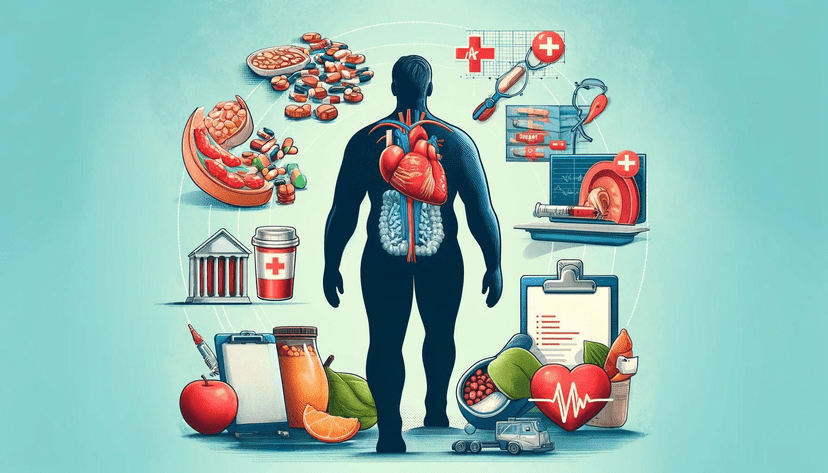Where did I go wrong? Putting on weight after gastric bypass

Understanding Weight Gain After Gastric Bypass
One of the prevalent issues that often baffles many post-operative patients is the paradox of weight regain after undergoing gastric bypass surgery. Contrary to what we might naturally assume, it's not uncommon for individuals to experience weight gain, despite the initial success of the surgery. This phenomenon can largely be attributed to a mix of factors including physiological, behavioral, and psychological elements.
Common Causes of Weight Regain
Upon encountering weight gain after surgery, it's crucial to understand that this occurrence isn't rare, nor is it solely your fault. It's a combination of several factors at play, starting with the body's natural response to sudden weight loss. The body's metabolic rate (the rate at which it burns calories) lowers in response to a significant reduction in body weight - an inherent survival mechanism designed to conserve energy when food is scarce. This physiological alteration can make it more challenging to maintain or continue weight loss following bariatic surgery.
Another contributing factor could be the patient's post-operative diet. One of the essential aspects of maintaining weight loss post-surgery is conforming to a diet plan that accommodates smaller portions and is low in surgar and saturated fats. However, gradually over time, some patients may revert to their pre-surgery eating habits, which can lead to weight regain.
Finally, a lack of routine physical activity can also contribute to weight regain. Regular exercise is imperative to maintain muscle mass and keeping metabolic rates at an optimal level.
The Role of Physiological Changes
Following gastric bypass surgery, our bodies undertake physiological changes to adapt to the new anatomy and how it interacts with food. Initially, there is a rapid weight loss due to limited food intake and absorption. However, over time, the smaller stomach pouch can stretch, allowing for more significant food consumption and thereby leading to weight regain. Moreover, the drastic weight reduction can trigger what's known as 'starvation mode,' where our metabolism slows down to conserve energy. This physiological response can make further weight loss challenging or even initiate weight gain.
Behavioral and Psychological Factors
Bariatric surgery is a tool, not a cure for obesity. Its success heavily relies on the adoption of long-term lifestyle changes. This is where behavioral and psychological factors heavily come into play. Adapting to new dietary habits, incorporating regular exercise, and adjusting to the associated mental and emotional changes represent ongoing challenges faced by many bariatric surgery patients.
It's not unusual for food to be used as a coping mechanism for stress, boredom, or other emotions, both positive and negative. This habitual behavior doesn't simply disappear post-surgery and can contribute to weight regain if not addressed. Thus, a crucial aspect of managing weight post-surgery requires commitment to mental health care, underlining the importance of psychological support and therapies in the journey of weight maintenance after surgery.
Understanding these factors can provide a roadmap to intervene and devise strategies to counteract weight regain. However, every patient's journey is unique, and so, it's vital to have ongoing conversations with healthcare specialists to tailor the right responses according to specific situations. Gastric bypass surgery is the initial step towards a healthier lifestyle - the comprehensive transition necessitates ongoing changes in diet, regular exercise, and mental health care.
Identifying Personal Triggers for Weight Gain
Recognition of personal triggers that can lead to weight regain after gastric bypass is an essential step in maintaining long-term weight loss. These triggers could range from certain dietary habits and lack of physical activity, to emotional eating and non-adherence to the post-surgery guidelines. Gaining a thorough understanding and being cognizant of these triggers can help you devise effective strategies to manage them. Let's take a closer look at these potential hurdles and discuss ways to conquer them.
Tracking and Modifying Dietary Habits
The cornerstone of maintaining a healthy weight after gastric bypass resides in dietary habits. Even after surgery, old food preferences and eating patterns often remain and can constitute a major hurdle for long-term weight loss.
To spot any unhealthy patterns, it is suggested you keep a food diary. Detailing what, when, and how much you eat, as well as any accompanying feelings or circumstances, will give you a clear and complete picture of your dietary habits. Over time, this practice will help you recognize patterns and identify foods or eating habits that trigger weight gain.
Once these triggers are identified, you can then work towards modifying them. This might mean substitifying high sugar or high fat foods with healthier alternatives, portion control or reframing your emotional connection to food. Remember to consult with a registered dietician or nutritionist for the best personalized advice.
The Importance of Regular Physical Activity
Physical inactivity is another potential trigger for weight regain. While the post-surgery period often involves reduced physical activity levels due to recovery, it’s indispensable to gradually resume and maintain regular exercise once you are medically cleared to do so.
Start with low-impact exercises like walking and gradually incorporate a mix of cardiovascular exercises, strength training, and flexibility drills into your regimen. Exercise not only helps in weight maintenance but also improves mood, boosts energy levels, and aids in managing chronic conditions. It is suggested to aim for about 150 minutes of moderate-intensity exercise per week, however, always consult with your healthcare provider or a physical therapist about an exercise regime tailored to your needs.
Addressing Emotional Eating and Stress Management
Emotional eating, or the tendency to eat in response to feelings rather than physical hunger, can be a significant obstacle for those trying to maintain their weight after gastric bypass. This issue often overlaps with stress, anxiety, and other strong emotions.
Learning to distinguish between physical hunger and emotional hunger is key. Deep-breathing exercises, mindfulness, and meditation can help manage stress, anxiety, and thus curb emotional eating.
You may also find it beneficial to work with a mental health professional who specializes in eating disorders or a support group. After all, maintaining weight loss is not a journey you have to travel alone; reaching out and asking for help is a crucial step towards sustainable health and wellness.
By being vigilant of these trigger points and learning how to navigate them, you are setting a strong foundation for long-term weight loss success after gastric bypass.
Strategies for Getting Back on Track
Experiencing weight regain after gastric bypass surgery can certainly feel like a setback. However, it is not the end of your weight loss journey. There are several strategies you can utilize to get back on track. This section will provide actionable advice tailored specifically for individuals who are navigating through this scenario. Professional guidance, altering your diet and exercise routines, and contemplating about surgical or non-surgical revision, all play a significant role in handling weight regain after gastric bypass.
Seeking Support from Healthcare Professionals
It is essential not to overlook the value of seeking assistance from healthcare professionals in managing post-surgical weight regain. Doctors, dietitians, and fitness trainers are equipped with knowledge and skills necessary to provide you with the right guidance. Here's why professional help is significant:
-
A doctor can carry out a thorough physical check-up to rule out any underlying medical reasons for weight regain like hormonal imbalance or other metabolic issues. They can also guide you on the most suitable way forward depending on your unique medical history and existing health status.
-
Consultation with a dietitian can offer personalized dietary guidance based on your current nutritional needs and gastronomical changes post-surgery. They can assist in formulating a balanced and sustainable diet plan facilitating healthy weight loss.
-
A fitness trainer can provide you with an appropriately paced and gradually intensifying exercise schedule designed around your post-operative capacity and needs. Remember, regular exercise complements dietary changes by speeding up metabolic rates and enhancing fat loss.
Revising Diet and Exercise Plans for Sustainable Weight Loss
Adapting your diet and exercise routines is a fundamental strategy when dealing with weight regain after gastric bypass.
On the diet front, Consider these guidelines:
-
Opt for high-protein foods and avoid high-carbohydrate and high-sugar food items. Protein-rich options keep you satiated for longer and help maintain muscle mass during weight loss.
-
Utilize the principle of 'volumetrics', eating larger portions of low-calorie, nutrient-dense foods like fruits and vegetables while maintaining overall calorie intake.
-
Incorporate timely and regular meals into your schedule instead of erratic and unplanned eating.
Regarding physical activity, a blend of cardio, strength training, and flexibility exercises typically yields the best result. However, it is crucial to pace yourself and increase the intensity and duration of exercise gradually under expert supervision to avoid any adverse health impact.
Exploring Revision Options When Necessary
Despite best efforts, sometimes dietary adjustments and ramped-up exercise routines may not yield the desired results. In such scenarios, exploring surgical and non-surgical revision options could be the next step.
You could benefit from non-surgical methods like endoscopic procedures, which are less invasive yet effective. Alternatively, re-surgical interventions are also options, although resorting to these methods should ideally be a last resort since they carry the same risks as the original gastric bypass surgery.
The takeaway to remember here is that encountering difficulty in your weight loss journey, including regaining weight after gastric bypass surgery, does not signify failure. Rather, it illustrates the complexity of sustained weight loss and the need for a multifaceted, sustainable approach. While the strategies mentioned above are key steps to consider, it is essential to remember that each individual's journey is unique, and the most effective approach will be one that aligns with your specific circumstances and needs under the guiding supervision of healthcare professionals.
In Summary
This blog post aimed to provide an in-depth understanding of weight regain after gastric bypass surgery. We've discussed the causes, including physiological changes, behavioral habits, and psychological factors, and addressed the importance of identifying personal triggers contributing to this issue. Distinct strategies, such as maintaining dietary habits, regular exercising, coping with emotional eating and stress management, were also outlined.
To deal with this, you'd first need to recalibrate your understanding of weight regain after such surgical procedures. It's not an indication of failure but a natural part of the process that can be managed effectively with the right help and practices.
Following are the action steps that might help you in this journey:
-
Identify and Accept the Problem: Take note of your weight and accept if there is a regain. It’s important to face the situation rather than live in denial.
-
Analyze Your Behavioral Patterns: Keep a food diary, note down your physical activity, and keep track of eating behavior, especially in times of stress or emotional disturbance.
-
Consult Healthcare Professionals: Reach out to your dietitian, doctor, fitness trainer, or mental health professional. They can provide personalized advice and guidance based on your unique situation.
-
Revise Dietary Habits: Make necessary changes to your diet by including high-protein and low-calorie, nutrient-dense foods. Also, ensure regular and timely meals.
-
Regular Exercise: As soon as you are medically cleared to carry out physical activities, start with low-impact exercises and then gradually increase the intensity and duration under the guidance of a fitness professional.
-
Use Emotional Support Systems: Reach out to support groups, friends, and family. You don’t have to go through this challenge alone.
-
Evaluate Revision Options when Necessary: If despite your best efforts, weight regain continues, discuss with your healthcare team for possible surgical and non-surgical revision options.
Remember, everyone's journey is unique. These steps are not set in stone but are meant to guide you. Modify them as necessary based on your specific needs and circumstances. The key is to remain patient and positive even if setbacks occur. With a comprehensive and sustained approach, managing weight after a gastric bypass can indeed be achievable.





